We’ve delved into the complex operations of geothermal heat pump systems in our latest update. Explore the intriguing features of these systems and acquire an in-depth knowledge of their parts, how they transfer heat, and the vital importance of the ground loop.
Explore the various types of geothermal heat pump systems and learn how they provide year-round comfort while significantly reducing utility bills.
Get ready to master the art of installing a geothermal heat pump system with our informative article.
Key Takeaways
- Geothermal heat pump systems use the natural heat stored in the earth to provide heating and cooling for buildings.
- Maximizing ground loop efficiency and maintenance is crucial for optimal heat transfer and system functionality.
- There are different types of geothermal heat pump systems, including closed loop, open loop, pond/lake, and hybrid systems.
- Geothermal heat pumps are energy efficient, cost-effective, and provide numerous benefits such as reduced dependence on fossil fuels and consistent heating and cooling throughout the year.
The Basics of Geothermal Heat Pump Systems
We’ll start by explaining the components and operation of geothermal heat pump systems.

Geothermal heat pumps are an innovative and efficient solution for heating and cooling commercial buildings. The installation process involves three main components: the ground loop system, the heat pump unit, and the distribution system.
The ground loop system consists of pipes buried in the ground, which absorb heat from the earth. This heat is then transferred to the heat pump unit, where it’s compressed and used to heat or cool the building.
The distribution system distributes the conditioned air throughout the building.
The benefits of geothermal heat pumps in commercial buildings are numerous. They provide consistent and comfortable temperatures, reduce energy consumption and greenhouse gas emissions, and offer long-term cost savings.

Understanding the Components of a Geothermal Heat Pump
Let’s take a closer look at the components that make up a geothermal heat pump system. Understanding these components is essential for successful geothermal heat pump installation and reaping the benefits of this efficient heating and cooling system.
Here are the key components:
-
Heat Pump Unit: This is the heart of the system, responsible for extracting heat from the ground and transferring it indoors during winter, and vice versa during summer.
-
Ground Loop: Consisting of pipes buried underground, the ground loop collects heat from the earth and carries it to the heat pump unit.
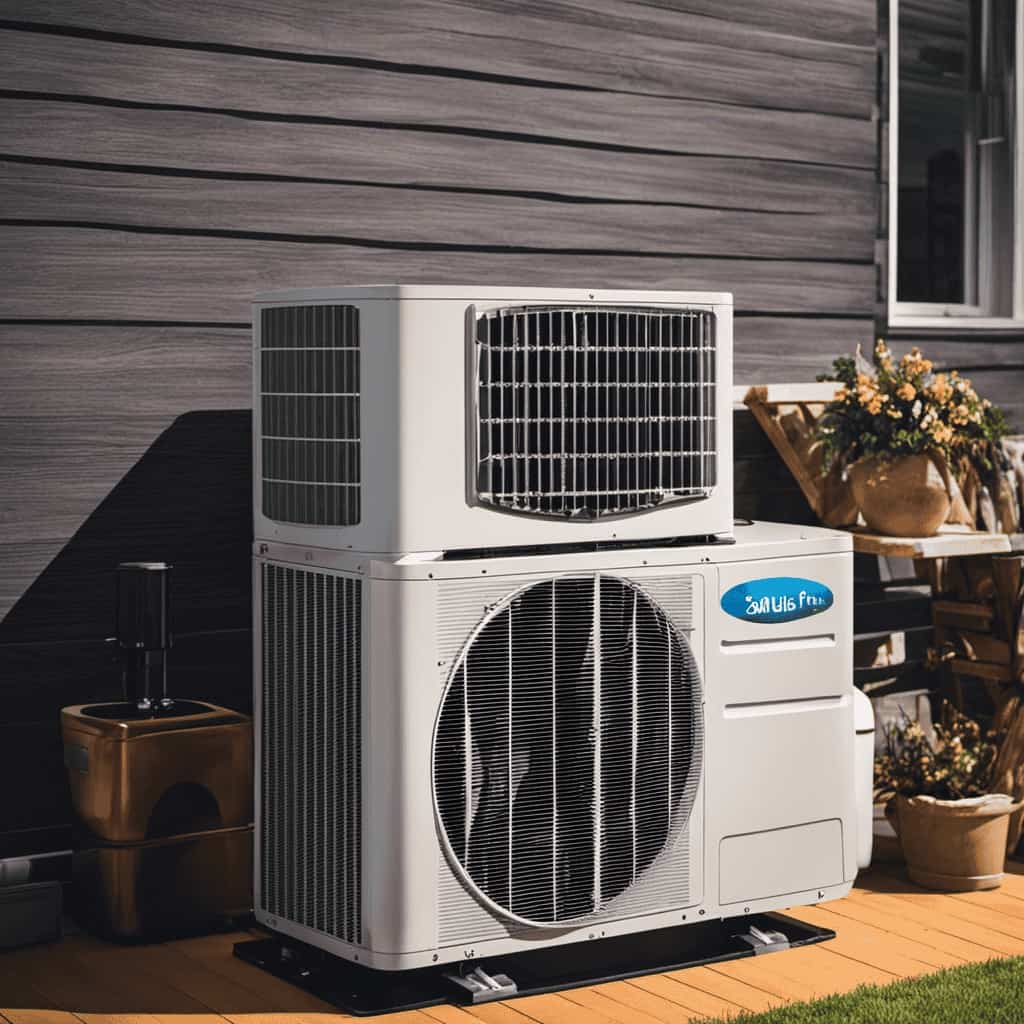
-
Heat Exchanger: This device allows the transfer of heat between the refrigerant in the heat pump and the ground loop.
-
Air Distribution System: This system consists of air ducts and vents, distributing the conditioned air throughout the building.
Understanding these components sets the foundation for comprehending how geothermal heat pumps transfer heat efficiently.
How Geothermal Heat Pumps Transfer Heat
The heat pump unit and the ground loop work together to efficiently transfer heat in geothermal heat pump systems.

Geothermal heat pumps use the natural heat stored in the earth to provide heating and cooling for buildings.
The process starts with the installation of the ground loop, which is a series of pipes buried underground.
These pipes are filled with a fluid, usually a mixture of water and antifreeze, that absorbs heat from the earth.
The heat pump unit then extracts the heat from the fluid and transfers it to the indoor space, providing warmth during the winter.
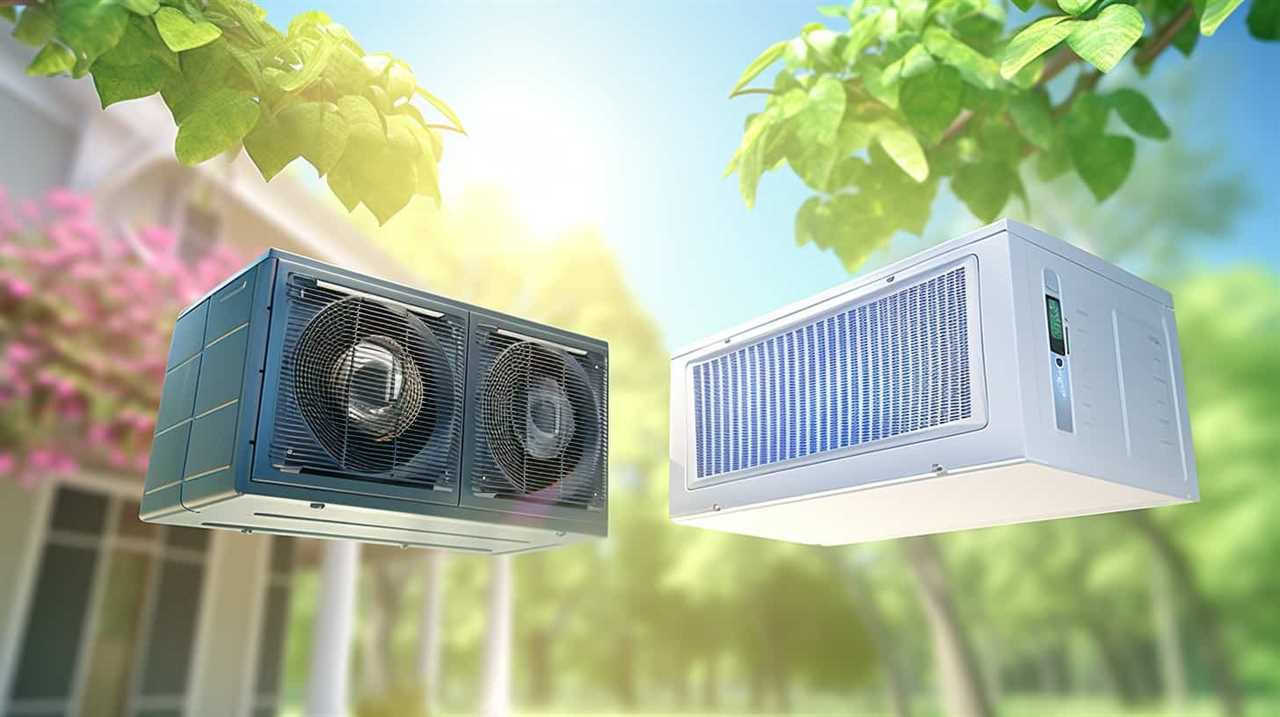
In the summer, the process is reversed, with the heat pump unit extracting heat from the indoor space and transferring it to the ground, effectively cooling the building.
This efficient transfer of heat is one of the many benefits of geothermal heat pump systems.
The Role of the Ground Loop in Geothermal Heat Pump Functionality
Let’s now explore the important role that the ground loop plays in the functionality of a geothermal heat pump system.
One key aspect is the ground loop’s efficiency in transferring heat between the earth and the heat pump.

Additionally, proper maintenance of the ground loop is crucial to ensure its long-term performance and reliability.
Ground Loop Efficiency
We’ve found that a key factor in geothermal heat pump functionality is the efficiency of the ground loop. The ground loop design and its optimization play a crucial role in maximizing the performance of the system.
Here are four important considerations for achieving high ground loop efficiency:
-
Sizing: Properly sizing the ground loop is essential to ensure optimal heat transfer between the ground and the heat pump. Undersized loops may result in insufficient heat exchange, while oversized loops can be costlier and less efficient.

-
Depth: The depth at which the ground loop is installed affects its thermal performance. Deeper loops can access more stable ground temperatures, enhancing the overall efficiency of the system.
-
Configuration: The layout and arrangement of the ground loop can significantly impact its efficiency. Horizontal loops require more land area but are easier to install, while vertical loops are suitable for limited spaces and offer higher efficiency.
-
Thermal conductivity: The thermal conductivity of the ground loop material influences its heat transfer capability. Using high-quality materials with excellent thermal conductivity can enhance the overall efficiency of the system.
Maintenance of Ground Loops
Ensuring the proper maintenance and regular inspection of ground loops is crucial for maximizing the functionality and longevity of geothermal heat pump systems, as well as optimizing their performance. To maintain the efficiency of ground loops, it’s important to follow some maintenance tips and troubleshooting guide.

Firstly, regular inspection of the ground loop system is essential to identify any potential issues such as leaks or blockages. Additionally, keeping the ground loop clean from debris or vegetation will prevent any obstruction to the heat exchange process.
It’s also recommended to check the pressure and temperature readings regularly to ensure the system is operating within the optimal range. By following these maintenance tips and troubleshooting guide, the ground loop system can continue to provide efficient and reliable heating and cooling for the geothermal heat pump.
Now, let’s explore the different types of geothermal heat pump systems.
Exploring the Different Types of Geothermal Heat Pump Systems
There are several options for geothermal heat pump systems available on the market. When considering the installation of a geothermal heat pump, it’s important to understand the different types and their advantages. Here are four common types of geothermal heat pump systems:

-
Closed Loop Systems: These systems circulate a liquid, usually water or antifreeze, through a closed loop of pipes buried underground. The heat is transferred between the fluid in the loop and the surrounding ground.
-
Open Loop Systems: These systems extract groundwater from a well and use it directly as a heat source or sink. After heat exchange, the water is either returned to the same aquifer or discharged elsewhere.
-
Pond/Lake Systems: These systems use a body of water as a heat source or sink. Water is pumped from the pond or lake and passed through the heat pump, where heat exchange occurs.
-
Hybrid Systems: These systems combine geothermal heat pumps with other heating and cooling technologies, such as air-source heat pumps or fossil fuel furnaces. This allows for greater flexibility and efficiency in different climate conditions.

Understanding the different types of geothermal heat pump systems is crucial in choosing the right one for your needs. Now, let’s delve into the topic of energy efficiency and how geothermal heat pumps can save on utility bills.
Energy Efficiency: How Geothermal Heat Pumps Save on Utility Bills
Geothermal heat pumps provide a cost-effective energy solution by significantly lowering monthly utility expenses. By harnessing the constant temperature of the earth, these heat pumps efficiently transfer heat in winter and remove heat in summer, reducing the need for traditional heating and cooling systems that rely on fossil fuels.
This energy efficiency not only saves homeowners money on their utility bills but also helps reduce their carbon footprint, making geothermal heat pumps a sustainable and environmentally-friendly option.
Cost-Effective Energy Solution
We can significantly reduce our utility bills by investing in a cost-effective energy solution like geothermal heat pumps. Here are four reasons why geothermal heat pumps are a smart choice for saving on utility bills:
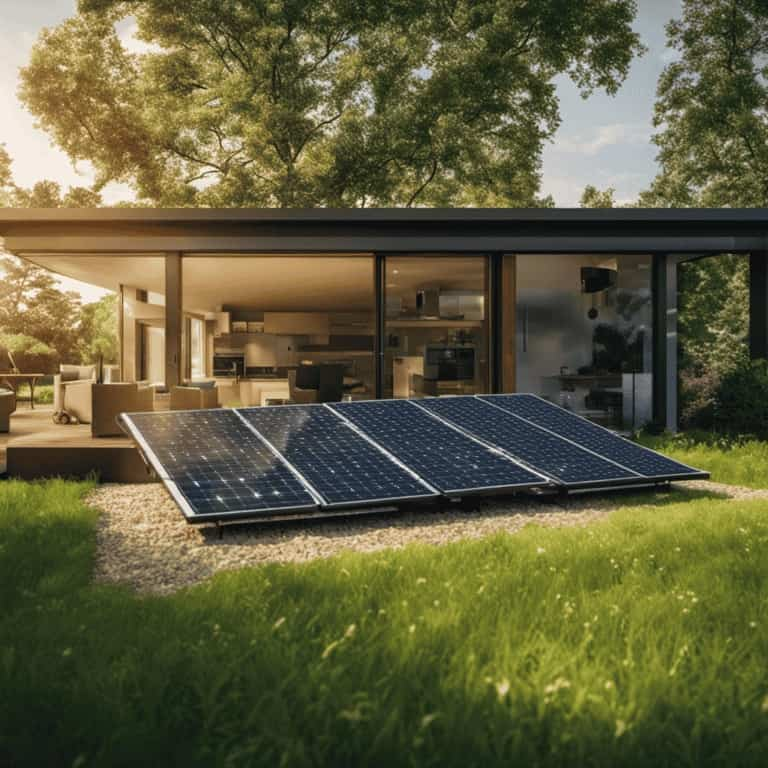
-
Energy Efficiency: Geothermal heat pumps use the Earth’s natural heat to provide heating and cooling, making them highly efficient compared to traditional HVAC systems. They can achieve energy efficiencies of up to 400%, resulting in substantial cost savings.
-
Reduced Maintenance Costs: Geothermal heat pumps have fewer moving parts and require less maintenance compared to traditional systems. This means lower maintenance costs over the lifespan of the system.
-
Long Lifespan: Geothermal heat pumps have an average lifespan of 20-25 years, which is longer than most traditional HVAC systems. This means fewer replacements and associated costs.
-
Environmental Impact: Geothermal heat pumps are an environmentally friendly option. They produce fewer greenhouse gas emissions and reduce dependence on fossil fuels, helping to mitigate climate change.

Investing in geothermal heat pumps not only saves on utility bills but also offers long-term benefits and contributes to a greener future.
Lowering Monthly Utility Expenses
By using geothermal heat pumps, we can effectively lower our monthly utility expenses and save on energy bills. Geothermal heat pump installation offers numerous benefits that contribute to reducing our overall energy consumption and costs.
Firstly, these pumps utilize the constant temperature of the earth as a heat source, which significantly reduces the need for traditional heating and cooling methods.
Secondly, geothermal heat pumps operate with an efficiency of up to 400%, meaning that for every unit of electricity used, they produce four units of heat. This high efficiency results in significant energy savings and lower utility bills.
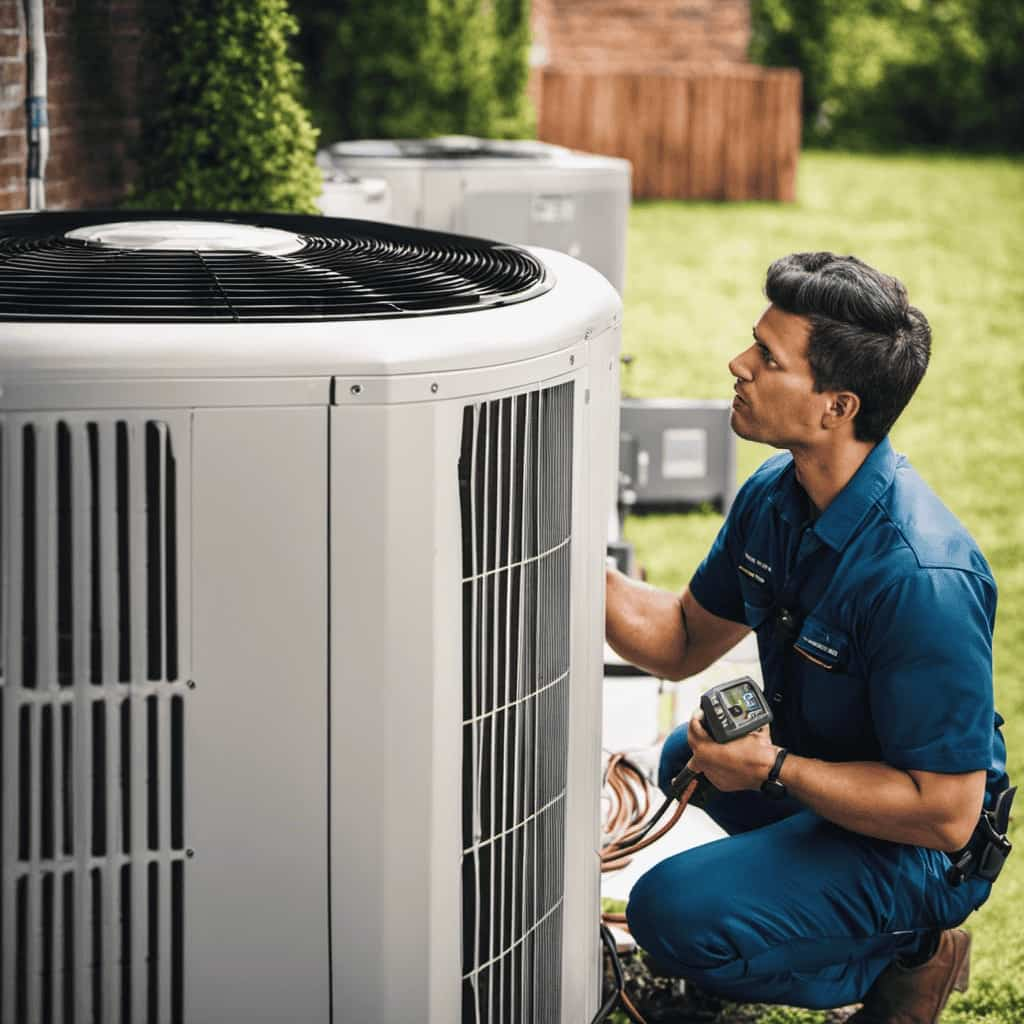
Additionally, geothermal heat pumps require less maintenance compared to conventional heating and cooling systems, further reducing our expenses.
Geothermal Heat Pumps for Heating and Cooling: Year-round Comfort
Throughout the year, we can enjoy consistent and comfortable heating and cooling with geothermal heat pumps. These innovative systems provide year-round temperature control while also promoting environmental sustainability.
Here are four key reasons why geothermal heat pumps are the go-to choice for year-round comfort:
-
Energy Efficiency: Geothermal heat pumps utilize the constant temperature of the earth to efficiently transfer heat, resulting in significant energy savings compared to traditional heating and cooling systems.

-
Consistent Performance: Unlike air-based systems, geothermal heat pumps aren’t affected by external temperature fluctuations, ensuring consistent performance regardless of the season.
-
Improved Indoor Air Quality: Geothermal heat pumps don’t rely on combustion or outdoor air, reducing the risk of indoor air pollution and allergens, leading to better indoor air quality.
-
Durability and Longevity: Geothermal heat pumps have fewer mechanical components exposed to the elements, resulting in longer lifespans and reduced maintenance needs.
With geothermal heat pumps, achieving year-round comfort isn’t only achievable but also environmentally responsible.

Factors to Consider When Installing a Geothermal Heat Pump System
When installing a geothermal heat pump system, one of the important factors to consider is the location of the property. The geographical characteristics of the area can significantly impact the efficiency and effectiveness of the system. Factors such as soil type, groundwater availability, and climate conditions play a crucial role in determining the feasibility and performance of the installation.
To emphasize the importance of these installation considerations, let’s take a look at the following table:
| Consideration | Description | Impact |
|---|---|---|
| Soil Type | Determines the heat transfer capacity and system design requirements | Clay soils have lower conductivity while sandy soils are more efficient |
| Groundwater | Availability of water source for heat exchange | Abundant groundwater can enhance system performance |
| Climate | Affects the system’s ability to extract or reject heat | Extreme temperatures may reduce efficiency and affect heating capacity |
Considering these factors during the installation process is essential to ensure optimal system performance and minimize any potential environmental impact. By carefully evaluating the installation considerations, one can make informed decisions and maximize the benefits of geothermal heat pump systems.
Frequently Asked Questions
What Are the Installation Costs Associated With Geothermal Heat Pump Systems?
Geothermal heat pump installation costs vary based on factors like system size, excavation requirements, and loop type. These expenses include equipment, labor, and permits. Factors affecting installation costs should be considered for accurate budgeting.

How Long Does It Typically Take to Install a Geothermal Heat Pump System?
Typically, it takes a few days to a week to install a geothermal heat pump system. The installation process involves drilling boreholes, laying pipes, and connecting the system to the house’s heating and cooling distribution system.
Can a Geothermal Heat Pump System Be Installed in Any Type of Home?
Yes, a geothermal heat pump system can be installed in any type of home. The geothermal heat pump installation process is versatile and can be adapted to older homes, providing benefits such as increased energy efficiency and cost savings.
Are There Any Maintenance Requirements for Geothermal Heat Pump Systems?
There are maintenance requirements for geothermal heat pump systems. Regular check-ups and filter cleanings are necessary to ensure optimal performance and energy efficiency. Keeping up with maintenance can extend the lifespan of the system.
What Are the Potential Environmental Benefits of Using a Geothermal Heat Pump System?
Geothermal heat pump systems offer potential environmental benefits such as increased efficiency and reduced carbon emissions. Additionally, homeowners may qualify for rebates and incentives that make these systems more affordable and attractive.
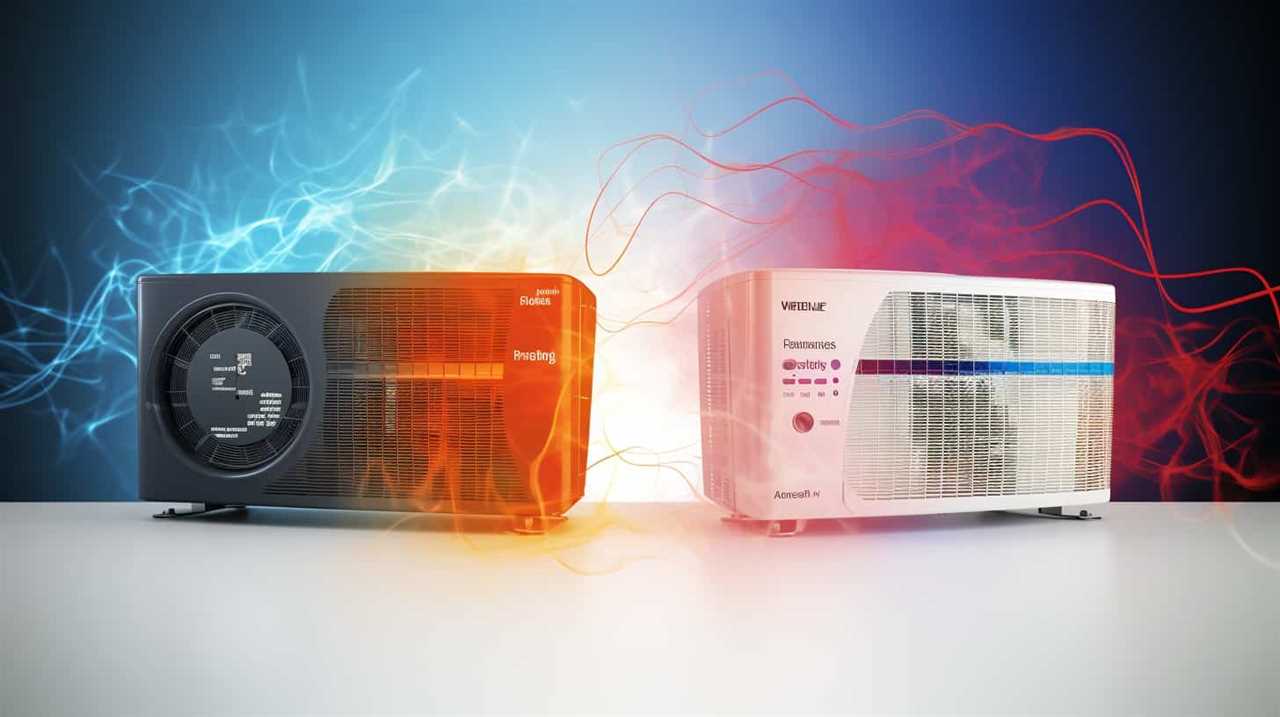
Conclusion
In conclusion, geothermal heat pumps offer a highly efficient and cost-effective solution for heating and cooling homes and buildings. By utilizing the natural heat stored in the ground, these systems can provide year-round comfort while significantly reducing utility bills.
The various types of geothermal heat pump systems allow for flexibility in installation, making them suitable for different climates and environments. When considering a geothermal heat pump system, factors such as location, size, and budget should be taken into account.









